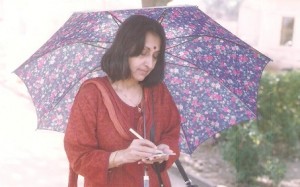Recently we got an opportunity to have a communication session with Veena Nagpal. Veena lives in India and is author by passion. Her latest book is The Uncommon Memories of Zeenat Qureishi.

Mrs. Veena Nagpal
Here is our conversation:
In the clutter that is my life, only two things are relevant – I live for my family and I love to write, write and write…
The written word has always fascinated me right from my childhood.
I was just seven, when I was attacked by a bitch, because I barged into a room where I had seen some books I wanted, without noticing that her litter of five pups was there too.
In college I won an international essay competition – that win, I suppose set the track of my life.
Writing is no ‘job’ for me – it is my passion. I must write just as I must breathe. If I don’t get my ‘me’ time even for a few days, I turn into one crotchety female who no one can tolerate for long.
I do hope that is not so.
As a writer I would want to be able to create memorable characters – gender notwithstanding.
My second passion – after writing – is travelling so I tend to take pictures that can capture the essence of people and places, preferably where I can see a creative angle or some special play of light and shade.
Karmayogi, published by Jaico, was my first novel. It was written very long ago – born of a back-packing experience in Punjab when I travelled by buses, bullock carts and any other means of transport available, into remote villages.
The theme – an individual’s struggle against a corrupt system – is as relevant today as it was then.
I am not, however, too proud of the quality of writing in that book. There is some straight-from-the-heart writing there, but the naïveté, both in the plot structure and in the language, does make me wince today.
I do think that as a writer, I have come a long, long way from Karmayogi.
Sometimes you don’t choose the story you want to tell, the story chooses you. It was a topic that had nagged at me since my young days. UMZQ was my way of getting it out of my system.
As far as controversies are concerned, they can get created even out of nothing. A writer, true to her calling, cannot always remain confined only to the ‘safe’ and the ‘easily consumable’.
As it has turned out, UMZQ is a truly balanced work and, if anything, provides a healing touch.
I have acknowledged my debt to nature in my dedication page in UMZQ. I quote:
“I owe you…
The breathe-me-oh-so-deep salt of the oceans, the exhilarating- hug-me-quick mountain airs, the arms-flung-wide-open blue skies. For seeping into my soul, whispering ancient secrets into my ears.
Flowers that bloom in my little green patch, bees and butterflies that flit through, squirrels and pigeons that drop by for their morning feed.
Gentle breezes that come to soothe my troubled days and share my joyous ones…
I owe you all.”
Nurture it.
In this interdependent world our relationship with nature is a WYGIWYG (what you give is what you get) affair. In my experience children are quicker to understand and appreciate this fundamental truth. Adults seem to have closed minds.
My children’s fiction ‘Tenderellla and the FoFs‘ is aimed at inculcating just such a nurturing spirit among children.
The story is about a Princess Tenderella who has been captured!
Angeroids, short, hairy, violent creatures, born of Human folly are fast overtaking the Forest where Tenderellas once ruled.
Winds are howling. Fires are raging. Forest Creatures, big and small are miserable. Flowers don’t bloom. Butterflies have forgotten to fly. Old Grandpa Magus whose touch made each bud smile and bloom, who, at the first sign of spring, sprinkled each plant with magic dust so that its dry branches suddenly burst forth into a million tender leaves, has lost his magic.
Can Ina and Mina, Rahul’s pet talking Mynahs, on a holiday in the Forest brave the journey deep into the Forest to find the Forever Tree who alone can tell how to forge the key that can unlock the secret prison where Angeroids are holding Princess Tenderella captive?
Can they persuade Rahul and his friends to become Friends of the Forest in word and indeed?’
The ‘gypsy’ blood in me makes me fall in love with every place I visit and ‘home’ is wherever I am – even if it is just for a night!
I have loved:
Amsterdam – for its old houses with their feet dipping into the canals criss-crossing the city, its flower markets, its cycle tracks, its buskars and its street performers and for Anne Frank’s house…
Istanbul for the Bosphorus beating at its shores, for its history so vividly alive at every nook and corner, its vibrant inclusive culture, the warm hospitality of its friendly people, its luscious fruits and vegetables…
Cappadocia for its unbelievable ‘fairy chimneys’ landscape and its tourist friendly services…
Miraflores in Peru, where people spontaneously burst into song and dance on the streets and artists are waiting to sketch your portrait in just a few strokes…
Kyoto in Japan, for its old world charm, its oh-so-gentle-polite people; Aqaba in Jordan for its crystal clear waters and for the ruins of Petra… and so many more places.
But at the end of my travels I just want to be back in my India… To its come-alive hustle bustle, its color, its noise, its loud and large hearted people – to my own little patch of green in Noida.
Until the travel bug bites again…
I think young Indian travelers, out to just enjoy the ‘experience’ of new places and people are on the right track. Older Indian travelers could perhaps, learn from them.
Such a loaded question! There is just so, so much to change… don’t start me on this topic – I’ll never end!
Stories will never go out of fashion but ethics and morality is certainly time and culture dependant. Grandparents – and their stories ethical or otherwise – can only stay relevant if they learn to keep pace with the incredibly fast changing times.
The ultimate who and why questions – who am I and why am I here in this world -plague me as much as they do any other human being and yes I have searched for meaning in life in ‘spiritual’ literature.
Vedanta – the Secret of Life Part 1, introduced me to the basic concepts of Indian wisdom.
Recently, Sally Kempton‘s Awakening Shakti was a definitive enlightening experience.
The Bhagwad Gita remains my refuge.
Haruki Murakami, Orhan Pamuk, and Paulo Coelho remain my favorite authors. Among Indian writers I like to read Amitav Ghosh.
In the last year or two I have enjoyed reading Gillian Flynn‘s Gone Girl, Suzanne Collins Hunger Games, Tan Twan Eng‘s The Gift of Rain, Hilary Mantel‘s Wolf Hall and Julian Barnes Sense of an Ending.
Maybe it’s this whole new generations of youngsters today who with their open minds, their global outlook, their fearless head-on facing of challenges that inspires me more than anything else and makes me wish I was starting my life all over again!
Hope you have enjoyed the conversation and found some of your questions answered by her. We found her a person with clear and firm thoughts about various stuffs.
Which other authors you like to interview us for you? Do let us know your thoughts and remarks via comments below. Do not forget to share this article with your friends over various social networks via Twitter, Facebook, Google Plus and others. And yes, you may like to subscribe to our RSS feeds and follow us on various Social networks to get latest updates for the site to land right in your mail box.
 ThinkerViews – Views And Reviews Personal views and reviews for books, magazines, tv serials, movies, websites, technical stuff and more.
ThinkerViews – Views And Reviews Personal views and reviews for books, magazines, tv serials, movies, websites, technical stuff and more.



